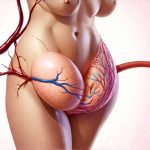Bloating is an incredibly common experience for many women, often fluctuating with the menstrual cycle, hormonal changes associated with perimenopause, or even during ovulation. It’s rarely fun, but it’s frequently dismissed as simply “part of being a woman.” While some discomfort can be expected, excessive or debilitating bloating shouldn’t be ignored and warrants investigation to rule out underlying medical conditions. However, for many, the source is tied directly to hormonal shifts impacting gut health and digestive function. This leads women to actively seek strategies to manage these frustrating symptoms, with increasing interest in natural approaches like dietary changes and supplementation – particularly probiotics. Understanding the complex interplay between hormones, the gut microbiome, and bloating can empower individuals to make informed decisions about their wellbeing and explore potential relief options.
The cyclical nature of female hormones significantly impacts gastrointestinal function. Estrogen and progesterone levels rise and fall throughout the menstrual cycle, influencing everything from gut motility (how quickly food moves through the digestive system) to intestinal permeability (“leaky gut”). These fluctuations can contribute to changes in water retention, gas production, and overall digestive discomfort. When hormone levels shift dramatically – as they do during PMS, ovulation, or perimenopause – the delicate balance of the gut microbiome can be disrupted, potentially leading to increased bloating, altered bowel habits, and even mood swings. Probiotics offer a potential avenue for mitigating these effects by supporting a healthier and more resilient gut ecosystem. You might find additional support in combining probiotics with dietary changes.
The Gut-Hormone Connection & Bloating
The intricate relationship between our gut and hormones is often referred to as the gut-hormone axis. This bi-directional communication system means that what happens in your gut significantly impacts hormonal balance, and vice versa. A healthy gut microbiome plays a crucial role in modulating estrogen levels through a process called the estrobolome – a collection of bacterial enzymes capable of metabolizing estrogens. When this process is impaired due to an imbalanced gut (dysbiosis), it can lead to estrogen dominance or deficiency, contributing to PMS symptoms like bloating, mood swings, and breast tenderness. Furthermore, dysbiosis can increase intestinal permeability, allowing inflammatory molecules to enter the bloodstream, exacerbating hormonal imbalances and triggering systemic inflammation. If you are adjusting to new medications, consider strategies for managing nausea which can often accompany these changes.
Bloating during specific phases of the menstrual cycle is often linked to water retention caused by fluctuating estrogen levels. Progesterone also slows down gut motility, leading to constipation and increased gas production as food sits in the digestive tract for longer periods. This creates an environment where bacteria can ferment undigested carbohydrates, resulting in bloating and discomfort. Ovulation itself can cause temporary bloating due to fluid shifts and hormonal changes that affect digestion. Recognizing these connections is key to understanding why probiotics might be a helpful strategy, as they aim to restore balance within the gut microbiome and potentially alleviate some of these effects. Practical food prep tips can also help manage symptoms through diet.
Importantly, it’s not simply about having bacteria in your gut; it’s about having the right kinds of bacteria. A diverse and balanced microbiome is more resilient and better equipped to handle hormonal fluctuations without causing excessive bloating or digestive upset. Probiotics can help cultivate this diversity by introducing beneficial bacterial strains that support healthy gut function.
Choosing The Right Probiotic Strains
Selecting a probiotic isn’t as simple as picking one off the shelf. Different strains have different properties and effects, so choosing the right ones for PMS-related bloating is essential. While research is ongoing, certain strains are showing promising results in addressing hormonal imbalances and digestive discomfort. Lactobacillus and Bifidobacterium are two of the most well-studied probiotic genera, with specific strains within these groups demonstrating particular benefits:
- Lactobacillus reuteri: Shown to support estrogen metabolism and reduce PMS symptoms, including bloating.
- Bifidobacterium infantis: May help modulate inflammation and improve gut barrier function, potentially reducing intestinal permeability.
- Lactobacillus acidophilus: Can aid in digestion and reduce gas production, alleviating bloating associated with constipation.
It’s important to look for probiotics that list the specific strain on the label (e.g., Lactobacillus reuteri DSM 17938) rather than just the genus and species. This ensures you’re getting a targeted approach. Consider looking for products with multiple strains, as diversity can be beneficial. Furthermore, CFU count (colony forming units) is important – generally, higher numbers indicate a more potent probiotic, but it’s not always the most crucial factor; strain specificity matters more. It may also be helpful to understand how to tell if nausea is related to gut or nerves, as this can influence your approach.
Incorporating Probiotics Into Your Routine
Simply taking a probiotic isn’t always enough to see results. Several factors can influence its effectiveness. First, timing is key. Some probiotics are best taken with food, while others are more effective on an empty stomach. Always follow the manufacturer’s instructions. Second, consistency is crucial. Probiotics need time to colonize the gut and exert their benefits, so regular use is essential. Don’t expect overnight miracles; it may take several weeks or even months to notice significant improvements.
- Start with a low dose and gradually increase it as tolerated to minimize potential side effects like gas or bloating (which are usually temporary).
- Combine probiotic supplementation with dietary changes that support gut health, such as increasing fiber intake from fruits, vegetables, and whole grains.
- Prebiotics – non-digestible fibers that feed beneficial bacteria – can enhance the effectiveness of probiotics. Good sources include onions, garlic, leeks, asparagus, and bananas.
Finally, remember that probiotics aren’t a one-size-fits-all solution. It may require some experimentation to find the right strains and dosage for your individual needs. If you have any underlying health conditions or are taking medications, consult with a healthcare professional before starting a probiotic regimen. Understanding physical tension patterns can also help address discomfort.
Beyond Probiotics: Holistic Approaches To Bloating
While probiotics can be a valuable tool in managing PMS-related bloating, they’re most effective when combined with other lifestyle and dietary strategies. Addressing the root causes of hormonal imbalance and gut dysbiosis is crucial for long-term relief. This includes:
- Dietary Modifications: Reducing processed foods, sugar, caffeine, and alcohol can all help minimize inflammation and support a healthier gut. Increasing intake of anti-inflammatory foods like fatty fish, berries, and leafy greens is also beneficial.
- Stress Management: Chronic stress can disrupt hormonal balance and negatively impact gut health. Techniques like yoga, meditation, or deep breathing exercises can help manage stress levels.
- Regular Exercise: Physical activity promotes healthy digestion, reduces inflammation, and improves mood – all of which can contribute to reduced bloating.
- Hydration: Drinking plenty of water helps flush out toxins and prevent constipation, reducing gas production and bloating.
Ultimately, managing PMS-related bloating is about taking a holistic approach that addresses both the hormonal and digestive aspects of this common issue. Probiotics can be a valuable component of this strategy, but they’re most effective when integrated into a broader lifestyle focused on wellbeing and balance. It’s important to remember that everyone is different, and what works for one person may not work for another. Listening to your body and seeking guidance from healthcare professionals are essential steps towards finding the right solutions for you. Safe holiday eating tips can also be helpful to keep in mind year round.


















